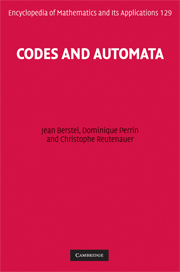Book contents
- Frontmatter
- Contents
- Preface
- 1 Preliminaries
- 2 Codes
- 3 Prefix codes
- 4 Automata
- 5 Deciphering delay
- 6 Bifix codes
- 7 Circular codes
- 8 Factorizations of free monoids
- 9 Unambiguous monoids of relations
- 10 Synchronization
- 11 Groups of codes
- 12 Factorizations of cyclic groups
- 13 Densities
- 14 Polynomials of finite codes
- Solutions of exercises
- Appendix: Research problems
- References
- Index of notation
- Index
8 - Factorizations of free monoids
Published online by Cambridge University Press: 05 March 2013
- Frontmatter
- Contents
- Preface
- 1 Preliminaries
- 2 Codes
- 3 Prefix codes
- 4 Automata
- 5 Deciphering delay
- 6 Bifix codes
- 7 Circular codes
- 8 Factorizations of free monoids
- 9 Unambiguous monoids of relations
- 10 Synchronization
- 11 Groups of codes
- 12 Factorizations of cyclic groups
- 13 Densities
- 14 Polynomials of finite codes
- Solutions of exercises
- Appendix: Research problems
- References
- Index of notation
- Index
Summary
This chapter investigates in a systematic way the notion of factorization of free monoids already seen in particular cases in Chapter 7. The main result of Section 8.1 (Theorem 8.1.2) characterizes factorizations of free monoids. It shows in particular that the codes which appear in these factorizations are circular. The proof is based on an enumeration technique. For this, we define the logarithm in a ring of formal power series in noncommutative variables. The properties necessary for the proof are derived. We illustrate the factorization theorem by considering a very general family of factorizations obtained from sets called Lazard sets.
Section 8.2 is devoted to the study of factorizations into finitely many submonoids. We first consider factorizations into two submonoids called bisections. The main result (Theorem 8.2.4) gives a method to construct all bisections. We then study trisections, that is factorizations into three submonoids. We prove a difficult result (Theorem 8.2.6) showing that every trisection can be constructed by “pasting” together factorizations into four factors obtained by successive bisections.
Factorizations
Several times in the previous chapter, we have used special cases of the notion of factorization which will be defined here. We shall see in this section that these factorizations are closely related to circular codes.
- Type
- Chapter
- Information
- Codes and Automata , pp. 301 - 326Publisher: Cambridge University PressPrint publication year: 2009

